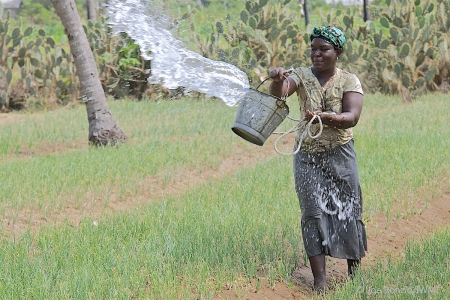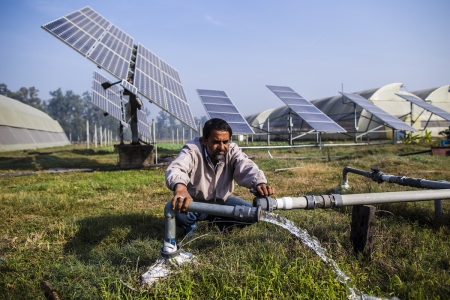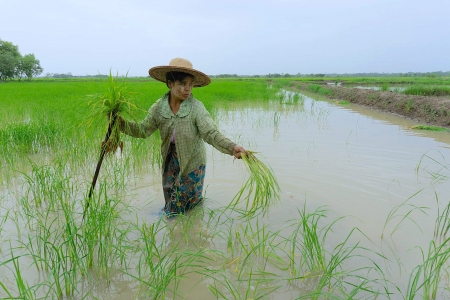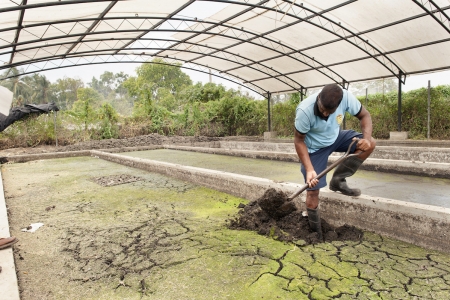"Does agriculture have a sustainable future?"
This question was posed to more than 40 people who participated in a recent WLE and UNESCO-IHE roundtable in Delft, the Netherlands. Surprisingly, they were split in their thinking on whether agriculture could become more sustainable.
What is clear is that sustainability is no longer just a development concept, but rather at the heart of global growth and prosperity. There is a growing recognition that issues such as climate change, migration, population growth, urbanization, food production, energy and natural resource management are interconnected and intertwined and that they therefore cannot be addressed in isolation.
The roundtable brought together representatives from WLE and other CGIAR research programs, UNESCO-IHE, Dutch organizations as well as guests from Europe for a dialogue on the topic of sustainability and agriculture.
“There is increasing political will to prioritize sustainability, as demonstrated in global initiatives, such as the Sustainable Development Goals and the Paris Climate Change Agreement, as well as in regional initiatives such as the 20x20 initiative or AFR100,” said Debbie Bossio, WLE Flagship Leader and lead CIAT Soil scientist. “But agricultural development is falling behind on the sustainability agenda. At least in the group of developing countries, the sector remains focused on technical fixes that focus on improving yield and productivity.”
Changing the mental model
The significant problems we have cannot be solved at the same level of thinking with which we created them. (Albert Einstein)
A lively panel discussion brought together a wide variety of perspectives on the question of whether or not agriculture can become more sustainable. Here is a video of the complete discussion:
Some of the main discussion points:
- Identifying ‘smart’ leverage points.
The complexity and range of issues make it difficult to quickly achieve turning points for agricultural sustainability. As pointed out by Jan Hijkoop, Senior Policy on Water, Land and Ecosystems at Dutch Ministry of Foreign Affairs, much of the migration from sub-Saharan Africa is rooted in lack of opportunities for youth and land degradation; still years of investment in agriculture did not stem the tide of migrants. The challenge is how to make smarter investments that generate wider impact, rather than putting money into a black box without clear evidence of change.
- Losing sight of local voices.
There as general agreement for the need to build upon smallholder systems, which still predominate in the developing world. As Joan Kagwanja, WLE Steering Committee Member and Chief, Land Policy Initiative at UN Economic Commission for Africa stressed, “If we want to engineer development then we need to start where the people are.” While there is a lot of land and potential to bring agriculture under sustainable intensification, we need to understand who owns the land and who has access to it. A key challenge that needs to be addressed for sustainability is that 80% of the land is under customary title, much of which is not legally recognized by government.
The current model of governments handing over land to private companies have largely failed because there is little local buy-in. Rather than continuing to try to fix this model, a new way to look at tenure from a local perspective needs to be encouraged. As one participant questioned: “We also need to look at who needs to change their practices. In terms of land tenure is it really the farmer, or do companies and governments need to change their attitudes and practices around customary land?”
- Reconciling conservation and agriculture.
The mental model around agriculture and biodiversity needs to be turned around. The current model is framed as a juxtaposition: it is either one or the other. Participants expressed the view that healthy ecosystems are at the heart of sustainable food production.
In relation to this, the point was that raised that large, poorly planned development projects are potentially more of a threat to local livelihoods than climate change as they do not take into consideration how local people rely on and make use of ecosystem services. Major barriers are vested interests and the perception that big projects will provide the big solutions.
- Is intensification part of sustainability?
A lot of this discussion centered on fertilizer. Fertilizer is necessary for soil fertility and food production but current practices cause many of the environmental problems associated with agriculture, such as high levels of pollution and eutrophication of water bodies.
Ken Irvine, a faculty member at UNESCO-IHE, pointed out that without nutrients in the ground we cannot grow more food. However, injudicious fertilizer use has high costs to the environment.
Fertilizer companies fail to address the environmental problems of chemical solutions rather than exploring new models, such recovering nutrients from fecal sludge or looking at smart application measures. The challenge will be to change mental models and incentives so that chemical companies develop new practices, breeding efforts on nutrient use efficiency increase and changing popular views around using human waste as fertilizer.
- Looking beyond silver bullet solutions.
Participants agreed that sustainable agriculture is not just about new technologies, but instead about understanding the trade-offs and synergies of different pathways. Nowhere is this seen as more important than in the climate change-related initiatives such as Climate Smart Agriculture (CSA).
CSA is based on three pillars: increased resilience and food security, adaptation to climate change, and mitigation where appropriate. However, there are massive differences amongst these three objectives and the stakeholders involved in achieving them. CSA proponents are largely silent on how to address these differences.
For one example, solar pumps for groundwater in India reduce emissions, are productive and profitable. But there are huge concerns about the sustainability of already diminished groundwater resources. Will a “CSA only” focus increase groundwater depletion in fragile environments?
As explained by Claudia Ringler, WLE flagship lead and leader of IFPRI’s Natural Resource Management theme, “CSA can be sustainable, but a lot more work is needed to understand and address the trade-offs. We cannot focus solely on improved technologies and intensification practices.”
Ways forward
The discussion brought up the inherent tensions and conflicting interests between the objectives of economic growth, ecosystem preservation, and poverty reduction. As one participant mentioned, we cannot think that this will simply be addressed by finding win-win solutions, but rather through identifying different types of incentives, both punitive and positive. Different actors will need to make different concessions and comprises.
The working group sessions allowed participants to go in more depth. Participants emphasized the need for more integrated ways of thinking. The solutions put forth might not provide the quick fix that governments and donors are looking for, but they do provide the basis for sustainability. They include:
- Smart local agriculture: Acknowledging and building upon local practices and customary tenure is essential for large-scale projects to succeed. Many participants called for “smart” local solutions that recognize an ecosystem and multi-functional perspective and actively work with women, men, and youth.
- More multi-stakeholder processes: Solutions need to incorporate multiple perspectives and ensure that different groups are not inadvertently affected.
- Rethinking capacity development: Capacity development is at the heart of change – Strengthening knowledge, skills and awareness of different actors is necessary to help them adapt to challenges more effectively. There was a call for new kinds of capacity development
- Understanding the realities on the ground: Governments and donors need to create more flexible and inclusive policies that can respond to more complex issues. Likewise there was a call to better understand how policies are implemented. There is a need to analyze how policies at global and national levels get translated into action on the ground and to identify ways forward to improve these linkages.
- Monitoring and data collection: Improved monitoring that can feed into policy and decision-making processes is essential for adaptive management and flexible policies. This was particularly called for in the case of improving land governance to be responsive to customary tenure as well as monitoring large projects and how they are being implemented.
For WLE going forward the roundtable proved a successful testing ground for its new Phase 2 agenda focused on enhancing sustainability of agriculture. However, the skepticism shown at the beginning of the discussion highlights the resistance to change our own attitudes and ways of working on agriculture.
WLE has a real opportunity to take the lead in strengthening the sustainability agenda within the CGIAR and in agriculture development more broadly to ensure complementariness to the overall framing within the SDGs. To do this, its partners and leaders will need to constantly adapt mental models and find ways to leverage local voices, scientific innovations and smart incentives for more sustainable agro-ecosystems for the benefit of all.






/index.jpg?itok=EzuBHOXY&c=feafd7f5ab7d60c363652d23929d0aee)









Comments
I have really enjoyed reading through this blog. Yes, agriculture does have a sustainable future.
However it is only through initiatives like this that we can succeed. It is quite interesting to see the outcomes of the round-table. However we need to now move past theories and start taking action. Sustainability must be at the forefront as we invest in agriculture, and this must start with each one of us playing their part.
Take a look: https://agriprofocus.com/post/577f4327a93f25734d12c361
This is an important discussion.
Currently it appears not to happen, I think the following basic things will always be important to achieve sustainable agriculture:
1. There is a limit to how much we can focus energy before the cost benefit ratio become problematic and we reach the point where we start to generate waste. This varies from place to place of course. So for the vast majority of space we need fairly low input cost, yet high "knowledge" farming.
2. We need to focus our efforts on determining what we want to achieve in terms of nutrition and health. What it is we believe we must achieve in terms of food, are we going to basically focus on kilojoules, or do we look at what we need for health - i.e. diversity of nutrition. These health issues were ingrained in traditional food cultures, so we really need to explore those cultures and bring it into the present scientifically. In this regard smallholders can be more productive than industrialized farming, if you look holistically at nutrition, instead of kilojoules.
3. When you increase soil carbon in an ecosystems approach, you tend to need to focus less on mineral soil nutrients. This ties in with the lower intensity farming aspects.
This means we need to integrate our human development patterns and obviously ownership patterns with the natural patterns and cycles in the world. And i believe one of the key aspects of this will be marketing the benefits of lower intensity farming and improve access to markets.
Agreed the devil is in the details, but globally our vision for health via nutrition requires a rethink as per the Tanzanian representative. We seem to be aiming for a much reduced food diversity in the face of enormous barrage of "lifestyle" diseases.
Excellent blog. We need to consider both large and small-scale farms, work with them and find locally sustainable solutions for their immediate problems. Working with multi-stakeholders supply chain actors is critical to develop solutions acceptable to most of them, if not all. Practical success case studies will be useful in educating the stakeholders to adopt sustainable solutions to agriculture.
La sostenibilidad de las agriculturas serán sostenible en virtud de nuestros "haceres"
The most intriguing question: Is Global Warming for Real? We don't know the environment in which Agriculture production be involve. Hard game ?